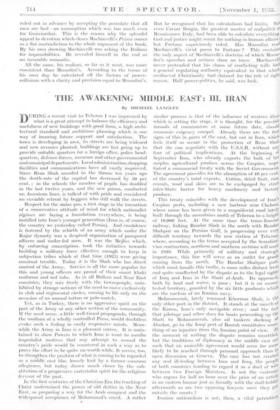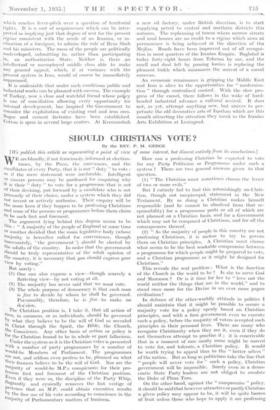THE AWAKENING MIDDLE EAST : III. IRAN
By MICHAEL LANGLEY
CURING a recent visit to Teheran I was impressed by similar process is that of the influence of western ideas what is a great attempt to balance the efficiency and usefulness of new buildings with good form, a high archi- tectural standard and ambitious planning which is one way of insuring future support and satisfaction. The town is developing in area, its streets arc being widened and new avenues planted, buildings arc fast going up to provide suitable quarters for a foreign office, police head- quarters, defence-forces, museum and other governmental and municipal departments. Local adinin istration, shopping facilities and communications have all vastly improved. Since. Reza Shah acceded to the throne ten years ago the death-rate of the capital has decreased by 50 per cent. ; in the schools the number of pupils has doubled in the last twelve years, and the new prison, conducted on American lines, is talked of with pride and considered an enviable retreat by beggars who still walk the streets.
Respect for the status quo, a first stage in the formation of a conservative attitude of mind for which nationalist riginies are laying a foundation everywhere, is being . instilled into Iran's younger generation (Iran is, of course, the country we yesterday called Persia). And confidence is fostered by the rebirth of an army which under the Kajar dynasty was a despised organisation of pampered officers and under-fed men. It was, the Mejliss which, by, enforcing conscription, took the initiative towards building a military force effective enough to keep. in subjection tribes which at that time (1925) were giving constant trouble. Today it is the Shah who has direct control of the Army. Service is all the more popular for this and young officers are proud of their smart khaki uniforms and red tabs. As in all Balkan and Near East countries, they mix freely. with thc, townspeople, unin- hibited by strange notions of the need to move exclusively in club and regimental circles, coming to life only on the occasion of an annual tattoo or polo-match. • • - Yet, as in Turkey, there is no aggressive spirit on the part of the Army or any other section of the community. If the need arose, a little well-timed propaganda, through the medium of a wholly controlled Press, would doubtless evoke such a feeling in easily responsive minds. Mean- while the Army in Iran is a pleasant career. It is main- tained to show Powers to which Iran is wont to ascribe imperialist motives that any attempt to . wound the country's pride would. be countered in such a way as to prove the effort to be quite 1m-worth-while. It serves, too, to strengthen the position of what is coming to be regarded as a middle east bloc, loosely knit by a former common allegiance, but today • drawn much closer by the sub,. stitution of a progressive materialist spirit for the religious fervour of the past. .
In the first centuries of the Christian Era the teaching of Christ undermined the power of old deities in, the Near East, .so preparing. a way for the Arab conquest and the widespread acceptance of Mohammed's creed. A rather • • which is setting the •stage, it is thought, for the possible inroads of communism at some future date, should economic exigency compel. Already there are the first signs of this in parts of the cast, but not in Iran, which feels itself so secure in the protection of Reza Shah that she can negotiate with the U.S.S.R. without ail)! fear of political implications. At the beginning of September Iran, who already exports the 'bulk of her surplus agricultural produce across the Caspian, nego' tiated a commercial treaty with the Soviet Government. The agreement provides for the absorption of 40 per cent, of the country's total exports. Cotton, dried fruit, rice, cereals, wool and skins are to be exchanged by strict inter-State barter for heavy machinery and • factory produce. • This treaty coincides with the development of Trail's Caspian •ports, including a new harbour near Chalons, whose name has been given to a magnificent road lately built through the mountains north of Teheran to a height of 10,000 feet. • At the same time the trans-Iranian railway, linking Bandar Shah in the north with Bandar Shahpur on the Persian Gulf, is progressing over very difficult territory towards the new station at Teheran, where, according to the terms • accepted by the Scandina' vian contractors, northern and southern sections will meet in 1939. While primarily of military and strategic importance, this line will serve as an outlet for goods coming from the north. The Bandar. Shahpur port, which must handle this traffic, is some miles distant froal and quite unaffected by the dispute as to the legal rights of Iraq and Iran in the Shatt al-Arab.. Its approach? both by land and water, is poor.; but it is on Uncoil' tested territory, guarded by the six little gunboats which are the nucleus of an Iranian navy.
Mohammerah, lately renamed Khorram- Shah, is the only other port in the district. It stands at the mouth of the Karim, Iran's only navigable river ; and the fact that pilotage and other dues for boats proceeding up the Shatt to Mohammerah, also oil tankers docking Ct Abadan, go. to the Iraqi port of Basrah constitutes some' thing of an injustice from the Iranian point of view. At the moment of writing the dispute remains unsettled, but the traditions of diplomacy in the middle east are such that an amicable agreement would -seem far more likely to be reached through personal approach than in open discussion at Geneva. The case has ' not created any real ill-feeling between Iran and Iraq, the people of • both countries tending to regard it as a duel of wits between two Foreign Ministers. Is not the customer who argues for half an hour over the price of an article in an• eastern bazaar just as friendly with the stall-holder afterwards as are two opposing lawyers one they get outside the courts ? • Iranian nationalism is not, then, • a vital patriotism which reaches fever-pitch over a, question of territorial rights.. It is a sort of ,acquiescence which can be inter- Prel ed as implying just that .degree of zest for the present egime consistent with the needs of an Iranian, or in- clination of a foreigner, to admire the rule of Reza Shah and his ministers. The mass of .the people are politically ,undeveloped, submitting to, rather than participating ;in, an authoritarian State, Neither is there ,an 1. intellectual or unemployed middle class.. able to make any general appeal, which,, if at variance with the Present system in Iran, would .of course be immediately suppressed., , It is undeniable that under such conditions public and industrial works can be planned with success. The example of Turkey, now a close and watchful friend whose pocy is one of conciliation alloWing every opportunity for internal development, has inspired the Government to consider the exploitation of existing coal and iron ores. Sugar and cement factories have been established. Cotton is spun in several large centres. At Kernianshah a new oil factory, under British direction, is to start supplying petrol to central and northern districts this autumn. The replanning of towns where narrow streets and mud houses are no credit to a regime which aims at permanence is being achieved at the direction of the Mejliss. Roads have been improved out of all recogni- tion in most quarters of the Iranian Empire. Baghdad is today forty-eight hours from Teheran by car, and the smell and dust left by passing .lorries is replacing the pleasant tinkle which announces the arrival of a camel caravan.
An economic renaissance is gripping the Middle East and Iran is alive to the opportunities for " modernisa- tion " through centralised control. NVith the slow pro- gress of the camel, there follows in the wake of hard- headed industrial advance a cultUral revival. It does .not, as yet, attempt anything new, but strives to per- petuate the old decorative arts of Ispahan which are this month attracting the attention they merit to the Iranian Arts Exhibition at Leningrad.



























































 Previous page
Previous page